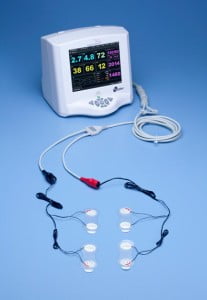US Adopts Israeli Device Saving Lives In Intensive Care Units
An Israeli medical device that is saving lives in intensive care units (ICUs) worldwide is now being tested at a dozen US hospital emergency departments to see if it could keep patients out of intensive care.
The NICOM (non-invasive cardiac output monitor), made in Israel by the Tel Aviv-based Cheetah Medical, is a uniquely non-invasive system used by medical centers in several countries to monitor hemodynamics – the movement of blood from the heart to the body’s organs.
These measurements help the medical team to determine the exact quantity of fluids the patient needs in the event of major surgery, trauma and especially sepsis. Sepsis is a life-threatening response to infection that causes more than 200,000 deaths in the United States every year. One in four hospital deaths is caused by sepsis, and it’s the reason for about half of the admissions to medical ICUs.
Sensor based measurement
“It’s important to measure how the blood flows when taking care of very sick patients, because there is an imbalance between the amount of oxygen and other nutrients delivered to the organs of the body,” explains Dr. Yoav Avidor, CEO of Cheetah. “The physician must stabilize the hemodynamic system so that all the organs get exactly what they need – not too much and not too little.”
Currently, this type of measurement is done mainly via invasive and expensive medical procedures that could sometimes cause life-threatening infections. Because of their drawbacks, doctors often tend not to use these procedures despite the vital information they can provide.
That’s the problem NICOM aimed to solve when it was introduced to the market four years ago. Invented by Hanan Keren, a Weizmann Institute of Science physicist, NICOM continuously collects all the necessary data from four sensors stuck onto the patient’s chest or back. A nurse can attach the sensors without calling in a medical specialist.
The device has already received FDA and CE Mark approvals.
Studying the results
In February, a study that aims to determine how using NICOM can save lives if it’s used in the emergency room in early stages of sepsis, had begun.
The study, named Cardiac Output Monitoring Managing Intravenous Therapy (COMMIT), is being conducted in 12 leading US hospitals emergency departments for the next year or two.
“Sep sis is a huge issue – one of the top killers, often as a complication of pneumonia or urinary tract infection and at times due to an infection acquired in the hospital,” says Avidor, a urologist by training. “It progresses rapidly and is difficult to treat. In advanced sepsis, all the body’s organs start to fail. Septic shock sets in and the mortality rate is about 40 percent.”
sis is a huge issue – one of the top killers, often as a complication of pneumonia or urinary tract infection and at times due to an infection acquired in the hospital,” says Avidor, a urologist by training. “It progresses rapidly and is difficult to treat. In advanced sepsis, all the body’s organs start to fail. Septic shock sets in and the mortality rate is about 40 percent.”
Earlier studies indicated that “if you start aggressively giving intravenous fluids early, under guidance so you give just the right amount, you can reduce mortality to about 24 percent. That’s pretty amazing: There aren’t too many things in healthcare that reduce mortality by 40 percent.”
Though several other medical device companies in the 1980s and 1990s offered non-invasive ways to monitor hemodynamics, none of them worked well enough to be adopted by hospitals, says Avidor. He adds: “NICOM is the first advance since then. Practically, it’s the only non-invasive system that hospitals actually buy and use on the really sick patients.”
Avidor hopes that using NICOM in the ER will show a reduction in deterioration of sepsis; the number of admissions to the ICU; intubations; and kidney and liver failure that are common complications of sepsis.
The principal investigator is Dr. Nathan Shapiro, an attending emergency physician at Beth Israel Deaconess Medical Center in Boston. “This is an exciting alternative to the invasive or empiric methods of the past,” he said. “My co-investigators and I seek to determine whether this theory will translate into clinical practice as an evidenced-based approach to reducing illness in an important population before they overtly deteriorate.”
Hundreds of critical care and anesthesia hospital units in the United States use NICOM, as well as in countries including the United Kingdom, Italy, South Korea and France. A few medical centers in Israel also have purchased it recently.
The device is manufactured in Israel and the company has headquarters in Vancouver and Washington. NoCamels
